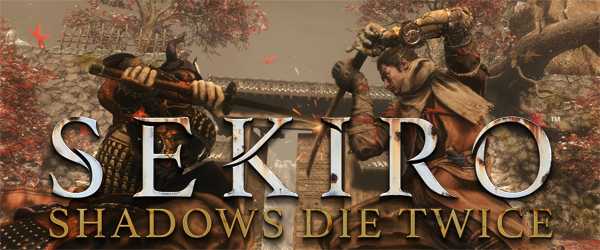
I never got into Tenchu because the
demos were too hard for younger me.
Oh, boy, was this a tough game to play and review! Frequent readers should probably know that I'm a huge Souls-Borne fan -- to the point of writing strategies and lore analyses. Sekiro is a bit different, however. It's much further divorced from Dark Souls than even Bloodborne was. Despite the lack of "Souls-Borne-ness" of Sekiro, I find it very difficult to put this review in any context other than of a new Souls-Borne release.
Sekiro is, ostensibly, a stealth game. There's more of Tenchu and Metal Gear in Sekiro than of Dark Souls. That's not necessarily a bad thing. I like stealth games just fine. The Metal Gear Solid games rank among one of my favorite game series ever.
I'm not terribly familiar with Tenchu, though. I think I played a demo of a PSX Tenchu game on one of my Official PlayStation Magazine demo discs (back in the day when publishers let players play pre-release demos, for free, instead of expecting us to pay for games long before they're even released, or holding the "open beta" hostage to a pre-order). I never bought the full Tenchu game because the demo was far too hard for my little 13 or 15-year-old gamer skills to handle. This was, of course, long before I started playing more demanding games.
Sekiro is in an awkward juxtaposition between Tenchu-inspired stealth, and Dark Souls-inspired boss fights.
However, there seems to be a certain degree of juxtaposition between Sekiro's desire to be a Tenchu-like stealth game, and its desire to feature demanding boss fights in-line with what is given in Souls-Borne games. In essence, we have two games here: a stealth game about staying out of sight of enemies and picking them off one-by-one; and a melee boss gauntlet in which the stealth isn't applicable at all. The first of those is good enough. The second one is where my problems begin...
My first playthrough of Demon's Souls was spent
cowering behind a shield.
All parry, all the time
You see, this really comes down to play-style. I was never a big parry-er in my Dark Souls-playing days. I parried a lot more in Bloodborne, but a big reason for that was that the guns allowed me to do so from a relatively safe distance. Heck, my first playthrough of Demon's Souls was done as the Royalty class, starting with the mana-regen ring, stabbing out with a winged spear from behind a shield, and using Soul Spear to dispatch any enemies I wasn't comfortable fighting up close. I hardly realized the parry mechanic existed!
Of course, I've grown and matured since 2008, and parrying has become a common element of my play-style. But I've still never been particularly good at it. This is causing me a lot of trouble in Sekiro because Sekiro's combat is all parrying, all the time! The new posture mechanic (which essentially replaces stamina) also means that a single parry isn't good enough to riposte and kill your enemy. You have to parry each strike in flurries of blows. For those coming from Dark Souls, imagine having to fight a hollow undead, and needing to parry every one of its wild slashes before you can riposte, instead of just the first one. That is what Sekiro expects and requires you to do.
Sekiro requires that you parry most attacks.
If you were a master-level parry-er in Dark Souls III, then you'll probably segue right into Sekiro with no problem and wonder what all the fuss is about. But for the rest of us plebs, that isn't going to be so easy.
This game plays much faster, enemies are much more aggressive, and health is in much smaller supply. Almost everything will kill you with two hits, and many grab attacks will drop you from full health to zero. This game leaves you with virtually no margin for error! Yet the mini-bosses and bosses have ridiculously high HP and posture.
... [More]
ecd29173-9c96-446a-944a-ddc20d5687ab|1|5.0
Tags:Sekiro, Sekiro: Shadows Die Twice, From Software, Activision, Hidetaka Miyazaki, Tenchu, Dark Souls, Demon's Souls, Bloodborne, stealth, boss, Japan, shinobi, samurai, mythology, lore, parry, deflect, deathblow, grinding
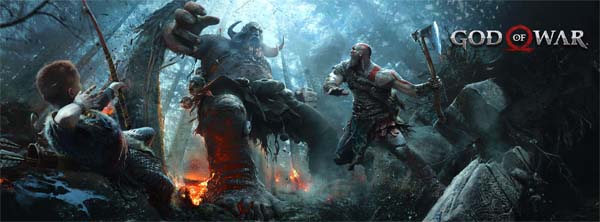
Vikings and norse mythology seems to have been a popular concept in games recently. Hellblade: Senua's Sacrifice, for instance, is an excellent hack-n-slash adventure through Norse hell. I've also been playing the Wasteland-like RPG Expeditions: Vikings on Steam (which I'm hoping to review soon). I also have games like Mount & Blad: Viking Conquest and Total War: Thrones of Britannia on my short list of games I'd like to play. And there was also the Viking character in For Honor.
Now, Sony's PlayStation flagship God of War has jumped from Greek mythology to Norse mythology. Having killed all the Greek gods, Kratos has apparently settled down in the mythological Midgard with a wife and son, only for his wife to die and his son be attacked by the Norse god Baldr. This sends Kratos and Atreus on a father-son bonding adventure to spread Atreus' mother's ashes from the highest peak in all the realms, and to learn why the Aesir are suddenly keen on hunting them.
Norse mythology seems to be a popular subject in media lately.
A father-son murder team
Atreus has some of the same problems that The Last of Us has with Ellie. Atreus doesn't feel vulnerable enough to demand protection, and he's rarely relevant outside of combat, except for his running commentary about what you're doing. Because of this, the actual game rarely feels like it's about protecting or escorting Atreus. And even though the game is ostensibly about Kratos teaching Atreus how to fight and be a man, the player never has an opportunity to actually teach the kid or take on any parental responsibility for him. It's just about Kratos throwing axes at draugr, and Atreus occasionally shoots them or jumps on their heads to help you out. The puzzle sections rarely require using Atreus (other than occasionally shooting something with his bow or having him scamper through a small tunnel).
Atreus is basically just an extra ranged attack.
That being said, I think that God of War makes some strides in the right direction (compared to The Last of Us). The player (and Kratos) can command Atreus to attack a target with his bow, which is one of the easiest and most consistent ways to deal stun damage to enemies, which opens them up to an intant-kill attack from Kratos. It's also a strategy that is pretty much essential on the harder difficulties. This creates a much greater sense of playing in tandem with Atreus, as he and Kratos often work together to defeat foes.
Atreus and Kratos can also break each other out of being grappled or stunned. I've never gotten a "Game Over" as a result of Atreus being defeated, so I'm not sure if that's a possible fail state. Being grappled or stunned only seemed to ever temporarily take Atreus out of the fight and negate the ability to use his bow. Either way, this is an improvement over Ellie from The Last of Us, who (as far as I recall) operated entirely independently from Joel, was never at any risk, and could be completely ignored for most of the player's time actually playing the game.
Kratos and Atreus can break each other out of enemy grapples and support each other in combat.
The important take-away here is that, unlike with Ellie in the combat encounters of The Last of Us, I never forgot that Atreus was there when playing God of War... [More]
569c96c8-73ad-4401-b3d2-4d2c9f75a74d|1|5.0
Tags:God of War, PlayStation 4, PS4, Sony, Sony Interactive Entertainment, exclusive, SCE Santa Monica Studio, sequel, Kratos, Atreus, Baldr, Freya, Magni, Modi, Midgard, World Serpent, escort quest, axe, Viking, Norse mythology, mythology, quicktime event, shifting the goalposts
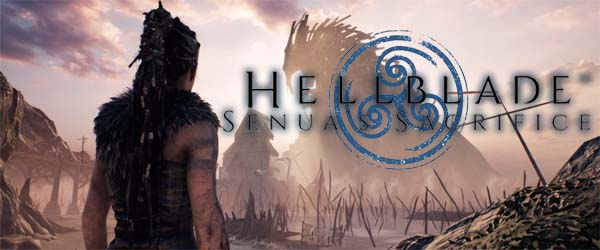
Ninja Theory is a developer that doesn't have very much work under their belt, but the work that they have done has type-cast them into a very specific niche of games. They got their start with the PS3-exclusive Heavenly Sword, and then went on to develop the rebooted DMC (Devil May Cry). So they specialize in stylish, fast-paced, thumb-blistering action games. Hellblade: Senua's Sacrifice is a bit different though. It still has plenty of hacking and slashing, but it's a much slower, more cerebral experience, and it's Ninja Theory's first game that seems to really be about something.
Death, love, and psychosis
One of the principle gimmicks of the game is its perma-death feature. Early in the game, Senua is afflicted by a black rot on her arm. Each time she dies, the rot grows, and if it reaches her head, then she is lost to the abyss. At that point, the game is over, and your save file is deleted. It's similar to the concept of hollowing in Dark Souls, except this time, the game is very upfront and explicit in informing you that it can put a premature end to your adventure.
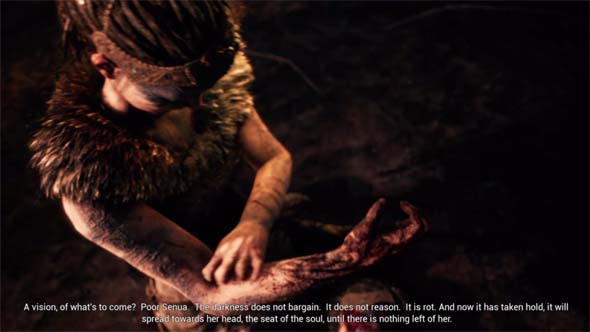
Out damned rot! Out, I say!
Each time you die, the rot grows. If it reaches your brain, it's game over, and your save file is deleted.
This upfront threat puts significant ludic pressure on the player to take Senua's life seriously and to play cautiously and defensively. Not only do you lose some small amount of progress when you die; you may lose all your progress if you are repeatedly sloppy. Ninja Theory isn't completely cruel though. As I progressed through the game, it became apparent that this mechanic is surprisingly forgiving. And if you want to know just how forgiving I think it is, then you can check out the super-duper-secret spoiler section at the bottom of this review. Early in the game, I started to suspect that the rot does not seem to progress if you die repeatedly to the same enemy or trap, so repeat deaths at the hands of a single particularly challenging encounter will not unfairly end your game. In fact, dying in boss encounters didn't seem to progress the rot at all! The combat difficulty is also set to automatically adjust itself by default. So if the waves of enemies become overwhelming for the player, the game will automatically scale them back.

PS Plus members can save scum
using the PS Cloud.
Also, if you happen to be playing on the PS4 (and are a PS Plus member), you can still save scum by using the PS Cloud feature. I would assume that you could also make a copy of your save file for the PC version. So you can use that for insurance if you want. Don't let the threat of perma-death stop you from playing this game.
The voices told me to
The second, and arguably more important, major gimmick of Hellblade is that the player character is a mentally and emotionally traumatized person who is suffering from severe psychosis. The most obvious manifestation is via voices in your head. The advice and information that these voices provide will even vary and will often conflict... [More]
b5fe948d-7b8b-4297-9a9f-28a743d532f9|2|5.0
Tags:Hellblade, Hellblade: Senua's Sacrifice, Senua, mythology, Norse mythology, Hell, Viking, Celtic, Pict, psychosis, hallucination, puzzle, rune, save scum, perma-death
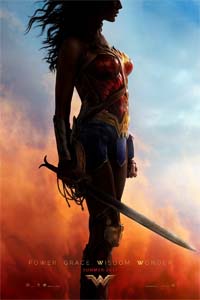
In their single-midned insistence on making all of their movies about epic showdowns between the superheroes and some big bad guy, the DC movies have consistently failed at depicting their heroes as having any particular desire or inclination to actually help people. This is perhaps the greatest failing of the Zack Snyder / Henry Cavill Superman movies and the greatest strength of the classic Richard Donner / Christopher Reeve Superman films: Snyder's / Cavill's Superman seems to treat saving people as a begrudging chore that he's obligated to do; whereas the classic Donner / Reeve Superman put on a charming smile and went out there to do good for the sake of doing good, simply because he is capable of doing good.
Well now, DC seems to have finally realized that the primary role of its superheroes is to be idealistic saviors and protectors. For the first time in the DCEU movies, our hero shows the idealistic optimism and desire to help people and do good that has been the trademark of the classic Superman films and the Spider-Man films (heck, even Amazing Spider-Man 2 got that right). But in this case, our hero isn't Superman or Spider-Man; our hero is Wonder Woman.
I actually don't mind the darker aesthetic and tone that DC has adopted for its movies. The problem so far has been that those movies have been dark and poorly-written and thought-out. Wonder Woman, on the other hand, is a much brighter movie (both in terms of visuals and thematic tone), and benefits from much tighter writing. The script is solid and tightly-themed, Wonder Woman has a full and nuanced character arc, the performances are good, the action looks slick, and (most importantly) it's easy to follow along with what's happening.
The biggest failing of the Zack Snyder / Henry Cavill Superman is that he seems to be begrudgingly helping people,
instead of happily doing good for the sake of doing good (as in the Richard Donner / Christopher Reeves Superman).
Gal Gadot provides a great performance that proves that her stealing the show in Batman v Superman wasn't just a fluke or a simple sign of how bad the rest of that movie was. She actually works well in this role and is almost as charming a Wonder Woman as Christopher Reeve was at being Superman. The supporting cast mostly works, and this is probably the best role that I've seen for Chris Pine to date. Some of the secondary characters are a bit under-written and lack screen time, but everyone (no matter how minimal their screen-time) has a role to play that helps shape Diana as a character. There's no superfluous characters like Louis Lane in either of Snyder's Superman movies. The only exception being, maybe, Steve Trevor's secretary, who actually deserved a lot more screen-time that she received.
Even Doctor Poison seemed to have a little bit of complexity and nuance to her character. She does suffer from some poor, underwritten motivation, as the movie never really seemed to go too deep into why she's doing what she's doing. But it's definitely apparent that there's something going on under the surface, beyond simply being manipulated by higher forces. The closest that I could figure is that she has some kind of relationship with General Ludendorff and is blindly loyal to him, but she at least wasn't a bad guy for the sake of being a bad guy.
Hits and misses
The only major weakness of Wonder Woman, as a movie, is that it's a bit of an uneven work. It's broken down into a readily discernible three-act structure. The first act is great, the second act is okay, and the third act sinks towards the DC stamp of terribleness. The unfortunate thing about this is that I walked out of the theater with a bad taste in my mouth, even though the movie was still mostly pretty good. So far, DC's movies have all started out mediocre and progressed towards terrible by the end. Wonder Woman, however, starts out good and starts to sink in the direction of bad at the very end. Which, I guess is a big improvement.
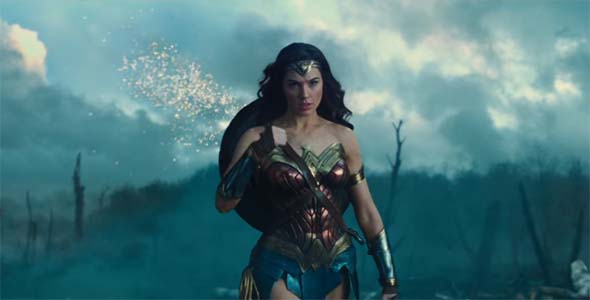
Act II concludes with Wonder Woman getting her first real "hero shot" in the movie.
The first act, set on the island of the Amazons, is colorful and vibrant. It's beautifully shot, with interesting and well-choreographed action sequences, and sprinkles of humor. If you didn't know better, you might be justified in mistaking it for a Marvel movie... [More]
40842c3b-0456-4b21-81c3-4fd9a6e449a8|0|.0
Tags:Wonder Woman, DC Comics, Gal Gadot, Diana Prince, Doctor Poison, Steve Trevor, Zeus, Ares, God of War, Amazon, Chris Pine, World War I, Germany, trench warfare, chemical weapon, mythology, Patty Jenkins, Zack Snyder
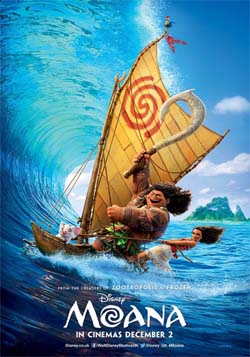
I saw Moana in theaters back in December. My girlfriend and I took our six-year-old to see it. I had meant to review it at the time, but it sort of slipped through the cracks of a busy holiday schedule. Well, now the movie is available for digital viewing and is going to be released on home video on March 7th. I'm already having to sit through it again, and will probably have to sit through it some more, and the six-year-old has been insisting on listening to the soundtrack in the car whenever we've driven anywhere over the past month or two. And you know what? I don't have a problem with it, because I really like this movie (and its soundtrack).
In the meantime, I've talked about this movie a lot. Everyone seems to like it, but I've found that I seem to like it for reasons other than the people who I've spoken to, which is why I decided to go ahead and write the review.
Most people seem to enjoy Moana for its progressive feminist messages. This is certainly true. She is the heir to her village's chiefdom, and this fact is taken completely for granted by the community. No one seems to question her ability to lead or her claim to authority based on her gender. Her ascendancy to authority (or a villain trying to prevent that ascendancy) isn't the central conflict of the movie. She isn't looking to marry in order to legitimize her claim, nor is anybody trying to marry her in order to usurp her throne. The idea of a woman being chief seems completely normalized in this society. There's no reason to believe that this village hasn't already had female chiefs (perhaps Moana's grandmother was a chief?), nor does anyone seem to think it would be unusual for the village to have a female chief in the future. The dispute between herself and her father are more ideological and practical, as she's drawn to the ocean by her desire to explore, while her father is committed to remaining on the island where it is presumably safe.
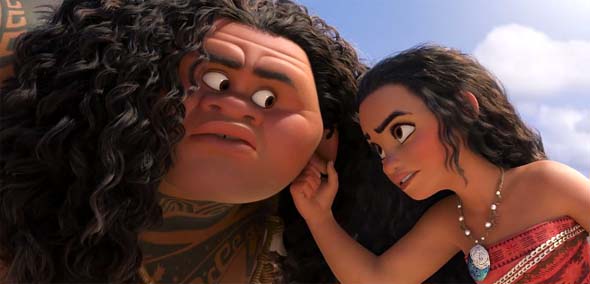
Moana is an excellent female role model, though at the cost of Maui being reduced to a narcissistic jerk.
There's also no silly or forced romance subplot, which is a huge deviation from the norm for the Disney princess archetype (and Maui even jokes that Moana is a princess). There's no romantic or sexual tension between Moana and Maui, nor does Moana feel any pressure to find love in order to make herself whole or validate her authority as village chief. She is a completely independent person. It is a shame that her strength as a character has to come at the expense of Maui (a beloved figure in the mythology of Polynesia) being portrayed as narcissistic jerk for most of the movie. But he does redeem himself at the end and is still a likable character.
The feminist and female empowerment messages are all well and good. But I think that my favorite element of the movie is that there's no traditional villain. There's a few incidental antagonists, but no central villain who directly opposes the heroes throughout the movie. There's no Maleficent, no Scar, no Jafaar, no Prince Hans. The big bad monster at the end of the movie is the closest thing the film has to an overarching villain, but even that isn't so much a genuine villain, as it is simply a misunderstood force of nature (and a rather obvious metaphor for human-induced climate change and ecological destruction).
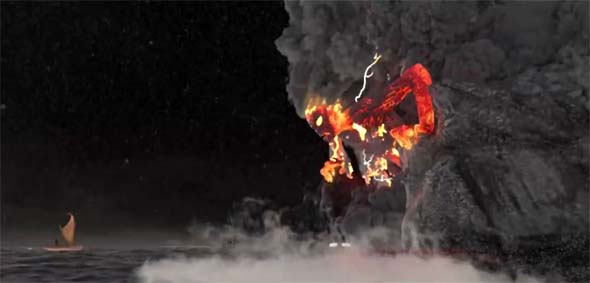
There is no true, singular villain. The big, bad monster at the end is more a misunderstood force of nature.
Moana's central conflicts are person versus self and person versus nature... [More]
97cbedc4-6479-4351-bec8-d70e764c3a94|2|3.0
Tags:Moana, Disney, Auli'i Cravalho, Dwayne "The Rock" Johnson, Lin-Manuel Miranda, Hawai'i, Polynesia, Maui, Motunui, mythology, creation myth, demi-god, princess ocean, way-finding, Te Fiti, Te Ka, Tamatoa, Kakamora, feminism, progressive, broadway
|

| 12 | | | | | | | 60 | | 11 | | | | | | | 55 | | 10 | | | | | | | 50 | | 09 | | | | | | | 45 | | 08 | | | | | | | 40 | | 07 | | | | | | | 35 | | 06 | | | | | | | 30 | | 05 | | | | | | | 25 | | 04 | | | | | | | 20 | | 03 | | | | | | | 15 | | 02 | | | | | | | 10 | | 01 | | | | | | | 05 |
|